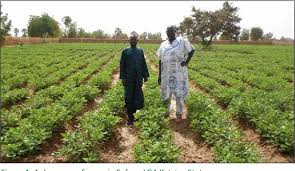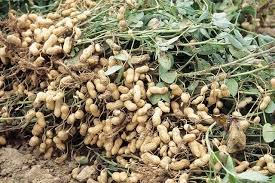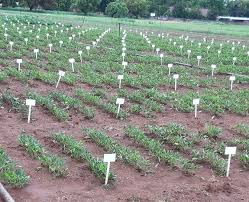![]()
If you’ve landed on this article page, you’re probably searching for a
good business idea—an idea that’s light on the pocket but heavy on
returns, promising both a fulfilling journey and potential profit.
|
How to start groundnut farming in Nigeria
Groundnut farming in Nigeria is one of the most lucrative
businesses in the country because of the demand for its highly
nutritious seed and most importantly the edible oil derived from
the seed. Groundnut is a good source of cheap protein both for
animals and human beings. Groundnut can be processed in various
ways depending on the product one wants to derive from it. The
nuts can be boiled, fried, roasted or it can be eaten with other
meals. The nut from the groundnut is a good source of cooking
oil. The nuts can also be crushed after a local cake called kuli
kuli can be made.
Interestingly, groundnut can be cultivated in a wide range of
environments. However, groundnut is mainly planted in the
Northern part of Nigeria in states like Kano, Kaduna, Adamawa,
Borno, Taraba, and Bauchi, etc. because groundnut tends to do
well in the arid or semi-arid regions.
Groundnut farming in Nigeria serves as a means of livelihood for
small-scale farmers, most especially in the Northern part of
Nigeria.
Varieties of groundnut: There are various varieties of groundnut
in Nigeria based on their yields and how they adapt to climate
conditions.
There are early-maturing varieties suitable for short rainfall
areas and late-maturing varieties suitable for areas with
prolonged rainfall. It is important to know the climatic
conditions of an area before deciding on the type of variety to
plant.
Soil Requirement and Planting
Groundnut thrives well in well-drained, sandy loam soil. Soils
with a pH of 6.5-7.0 with high organic matter are ideal for
groundnut to thrive. Groundnut requires an optimal temperature
of 27°C-30°C and 24°C-27°C for good germination, vegetative
growth, and reproductive growth. An optimum annual rainfall of
450 mm-1250 mm is required for good growth and yield. Groundnuts
can also be produced under irrigation and they tend to produce
better pods and good fodder yields.
Groundnuts may be planted on flat ground or ridges, but research
has shown that planting on ridges produces a higher yield
compared to those planted on a flat surface. Planting on ridges
allows easy drainage of excess water to avoid seedbed compaction
and also facilitates field operations such as weeding and
fertilizer application.
Getting the right variety of seed is very important because it
will determine the yield to be obtained. Ensure that seeds for
cultivation are from a reputable seed source, and check also the
viability of the seed and its lifecycle. It is good to know the
varieties of seed to plant at each planting season, the
early-maturing varieties are more suitable for areas with
shorter rainfall, while the late-maturing varieties thrive well
in areas with longer rainfall duration.
It is also advisable to treat groundnut seeds with fungicides to
avoid rot and pre/post-emergence damping-off of seedlings due to
fungal attack.
Groundnut is usually planted at the onset of the rainy season.
The plant spacing varies across varieties but on average 75cm x
20cm, 75 cm x 10cm, or 50cm x 20cm are recommended for bunch
varieties, while spreading varieties can be planted at 100cm x
20cm or 75cm x 25cm.
Weed control
The weeds on a groundnut field can be controlled using cultural,
mechanical, or chemical means during the initial six weeks
because the weeds compete effectively with the groundnut during
the first 3-6weeks. Pre emergence herbicides can be applied
after planting to help control the weeds effectively.
Harvesting
Groundnut can be harvested either by hand to pull the entire
plant or a hoe can be used to dig around the plant. Groundnut
can be harvested 4- 5 months after planting or when the pericarp
starts turning dark from the inside. It is recommended to
harvest when 70-80% of the pods have matured. After harvesting
soil should be dislodged from the pods and the pods left upwards
for 2-3 days. This will allow the pods to dry faster and also
prevent fungal growth. Harvested groundnut plants are stacked in
the field for a few days to allow the pods to be air and
sun-dried before stripping the pods. The pods are subjected to
further drying to reduce the moisture content below 10%. After
drying the pods are cleaned and graded in bags.
Groundnut market in Nigeria
Groundnut is one of the most essential raw materials in Nigeria
because of the high demand for its products and by-products.
Groundnut after harvesting can be sold to individuals and
processing factories depending on what it wants to be used for.
Some of the products that are gotten or made from groundnut
include:
– Groundnut can be processed into cooking oil
– Groundnuts can be roasted, boiled, or dried to be eaten as
snacks
– Groundnut can be used in preparing Kuli kuli
– Groundnut can be processed into peanut butter
– Groundnut soup is also prepared using groundnut.
Price of groundnut in Nigeria.
On average, the price of a 100kg bag of groundnut is between
N80, 000- 100, 000 in the open market depending on the season
and location.
Research has shown that groundnut farming in Nigeria and Africa
has the potential to produce high yields with the use of modern
farming techniques and improved seed varieties. The average
yield per hectare in Nigeria is about 1.3 tonnes, while in other
African countries, the yield is between 1.5 to 2 tonnes per
hectare. The yield can be increased through good agricultural
practices, such as proper crop management, timely application of
fertilizers, and adequate pest and disease control. Groundnut
farming can also provide a source of income for farmers and
contribute to the economic growth of Nigeria and Africa.
Groundnut farming in Nigeria and Africa offers various types of
businesses that farmers can engage in to add value to their
products and increase profitability. Here are some types of
groundnut farming businesses in Nigeria and Africa:
Groundnut farming for food production: Groundnuts are used in
the production of various local dishes and snacks, and farmers
can engage in groundnut farming to meet the demand for food
production.
Groundnut oil production: Groundnut oil is used for cooking, and
farmers can set up oil mills to produce groundnut oil from their
harvested groundnuts.
Groundnut cake production: Groundnut cake is a by-product of
groundnut oil production and can be used for animal feed
production.
Groundnut butter production: Groundnut butter is a spread made
from roasted groundnuts and can be sold as a snack or used for
food production.
Groundnut snack production: Roasted groundnuts can be sold as a
snack, and farmers can engage in this business by producing and
packaging roasted groundnuts for sale.
Groundnut paste production: Groundnut paste is a common
ingredient in many local dishes, and farmers can engage in the
production of groundnut paste to meet the demand.
Groundnut milk production: Groundnut milk is a dairy-free
alternative to cow’s milk and can be produced from groundnuts.
Farmers can engage in the production of groundnut milk to meet
the demand.
Groundnut exportation: Groundnuts can be exported to other
countries, and farmers can engage in groundnut farming for
exportation purposes.
Groundnut roasting and packaging: Groundnuts can be roasted and
packaged for sale as snacks, and farmers can engage in this
business to add value to their products.
Groundnut storage facilities: Farmers can provide groundnut
storage facilities to other farmers or individuals who need to
store their harvested groundnuts.
Groundnut distribution: Farmers can engage in the distribution
of groundnuts to local markets, supermarkets, and other retail
outlets.
Groundnut farming consultancy: Farmers can provide consultancy
services to other farmers or individuals who want to engage in
groundnut farming.
Groundnut seed production: Farmers can produce high-quality
groundnut seeds for sale to other farmers or individuals who
want to engage in groundnut farming.
Groundnut farming presents a significant opportunity for
agricultural and economic development in Nigeria, and with the
right approach, can yield high returns for farmers and
agro-allied businesses.
Get our practical training guide on Groundnut farming in Nigeria
with a comprehensive guide on how to start Groundnut farming in
Nigeria, covering key aspects such as site selection, species
selection, farm setup, and management practices.
|







